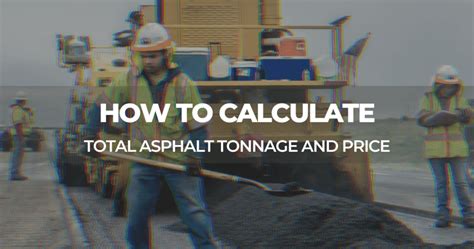How to Calculate Asphalt Tonnage with Ease
Calculating asphalt tonnage accurately is crucial for any paving project, ensuring you have the right amount of material delivered and minimizing waste. Whether you're a seasoned contractor or a homeowner tackling a small driveway project, understanding how to calculate asphalt tonnage will save you time, money, and headaches. This comprehensive guide breaks down the process step-by-step, addressing common questions and providing practical examples.
Understanding the Key Factors
Before diving into the calculations, let's identify the essential elements:
- Area: The total surface area you need to cover with asphalt, measured in square feet (sq ft) or square yards (sq yd).
- Thickness: The desired depth of the asphalt layer, typically measured in inches. This depends on the application (driveway, road, etc.) and existing base conditions.
- Density: The weight of asphalt per cubic yard or cubic foot. This varies slightly depending on the mix design but generally falls within a specific range.
The Formula: From Area and Thickness to Volume
The fundamental calculation involves converting area and thickness into volume, then using density to determine the weight (tonnage). Here's the breakdown:
-
Calculate the volume in cubic yards:
-
If your area is in square yards: Volume (cubic yards) = Area (sq yd) * Thickness (yd) Remember to convert inches of thickness into yards by dividing the inches by 36 (36 inches = 1 yard).
-
If your area is in square feet: First, convert square feet to square yards by dividing by 9 (9 sq ft = 1 sq yd). Then, use the formula above.
-
-
Calculate the weight in tons:
-
Once you have the volume in cubic yards, multiply it by the density of asphalt. A typical density is around 140 pounds per cubic foot (pcf), or approximately 2.5 tons per cubic yard. Therefore, the formula is: Weight (tons) = Volume (cubic yd) * 2.5 tons/cubic yd
-
Important Note: The density of asphalt can vary slightly depending on the specific mix design and aggregate used. Always confirm the precise density with your asphalt supplier. They will often provide this information on the delivery ticket.
-
Example Calculation
Let's say you're paving a driveway with an area of 200 square feet and want a 4-inch thick layer of asphalt.
-
Convert square feet to square yards: 200 sq ft / 9 sq ft/sq yd = 22.22 sq yd
-
Convert inches to yards: 4 inches / 36 inches/yd = 0.11 yd
-
Calculate volume in cubic yards: 22.22 sq yd * 0.11 yd = 2.44 cubic yards
-
Calculate weight in tons: 2.44 cubic yards * 2.5 tons/cubic yd = 6.1 tons
Therefore, you'll need approximately 6.1 tons of asphalt for this project. Always round up to ensure you have enough material.
Frequently Asked Questions
What is the average density of asphalt?
The average density of asphalt is approximately 2.5 tons per cubic yard, or 140 pounds per cubic foot. However, this can vary slightly depending on the specific mix design and aggregate used. Always check with your supplier for the precise density.
How do I account for compaction?
Asphalt compacts after it's laid, meaning the final volume will be slightly less than the initial volume. This is usually factored into the mix design by the asphalt producer. You generally don't need to make separate adjustments for compaction unless you're working with unusual circumstances or very large projects.
What if I’m paving a complex shape?
For irregularly shaped areas, you may need to break the area down into simpler shapes (rectangles, triangles, etc.) and calculate the volume for each section individually. If the shape is very complex, consider using digital tools or consulting a paving professional for accurate measurements.
What other factors might affect asphalt tonnage?
Beyond the basic calculations, factors such as the condition of the existing base layer and the presence of any slopes can influence the amount of asphalt needed. A poorly prepared base may require more asphalt to achieve the desired thickness and stability.
By following these steps and considering these factors, you can confidently calculate the asphalt tonnage needed for your project, ensuring a smooth and successful paving job. Remember to always double-check your calculations and consult with your asphalt supplier for any specific questions or concerns.

